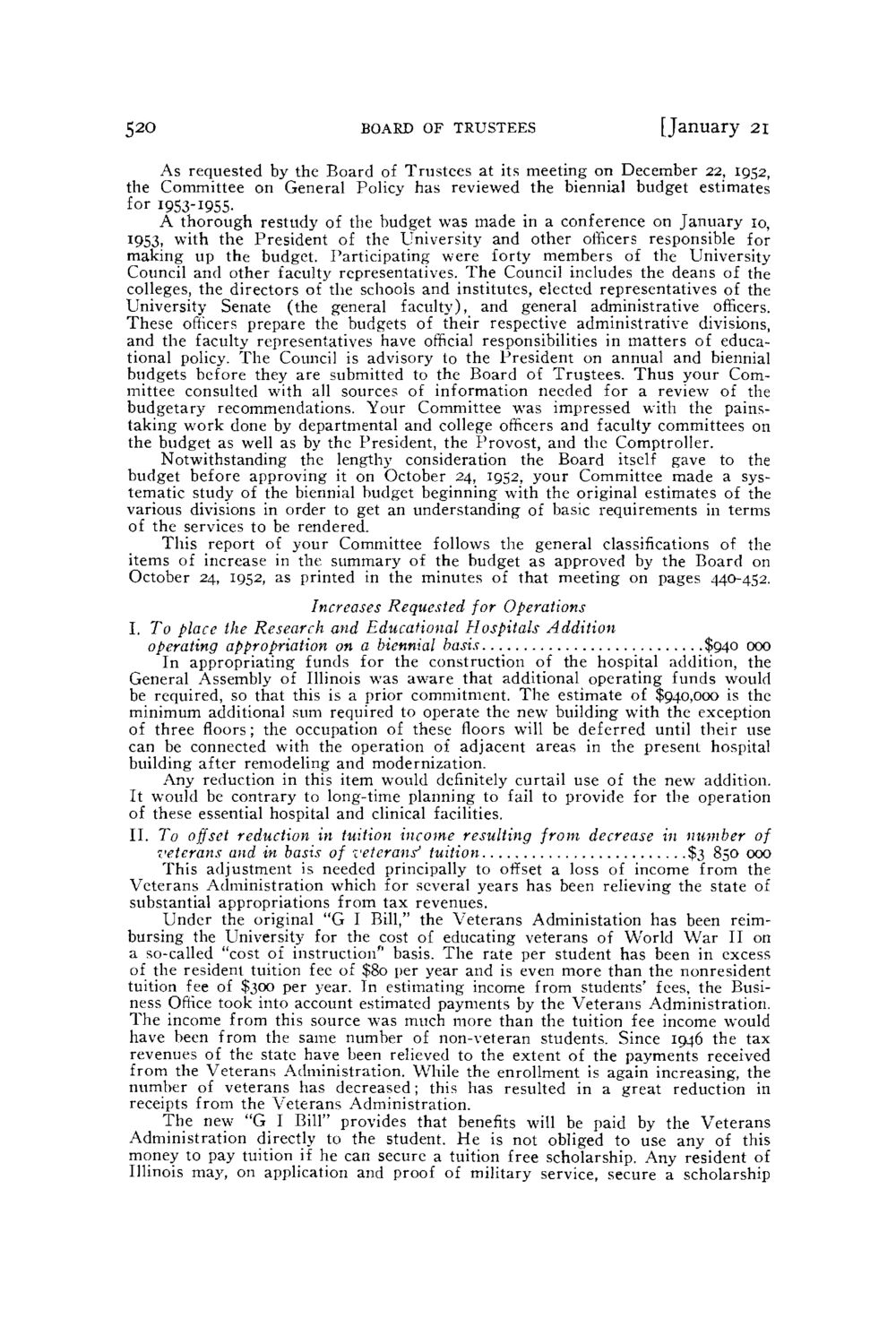| |
| |
Caption: Board of Trustees Minutes - 1954
This is a reduced-resolution page image for fast online browsing.

EXTRACTED TEXT FROM PAGE:
520 BOARD OF TRUSTEES [January 21 As requested by the Board of Trustees at its meeting on December 22, 1952, the Committee on General Policy has reviewed the biennial budget estimates for 1953-1955A thorough restudy of the budget was made in a conference on January 10, J 953. with the President of the University and other officers responsible for making up the budget. Participating were forty members of the University Council and other faculty representatives. The Council includes the deans of the colleges, the directors of the schools and institutes, elected representatives of the University Senate (the general faculty), and general administrative officers. These officers prepare the budgets of their respective administrative divisions, and the faculty representatives have official responsibilities in matters of educational policy. The Council is advisory to the President on annual and biennial budgets before they are submitted to the Board of Trustees. Thus your Committee consulted with all sources of information needed for a review of the budgetary recommendations. Your Committee was impressed with the painstaking work done by departmental and college officers and faculty committees on the budget as well as by the President, the Provost, and the Comptroller. Notwithstanding the lengthy consideration the Board itself gave to the budget before approving it on October 24, 1952, your Committee made a systematic study of the biennial budget beginning with the original estimates of the various divisions in order to get an understanding of basic requirements in terms of the services to be rendered. This report of your Committee follows the general classifications of the items of increase in the summary of the budget as approved by the Board on October 24, 1952, as printed in the minutes of that meeting on pages 440-452. Increases Requested for Operations I. To place the Research and Educational Hospitals Addition operating appropriation on a biennial basis $940 000 In appropriating funds for the construction of the hospital addition, the General Assembly of Illinois was aware that additional operating funds would be required, so that this is a prior commitment. The estimate of $940,000 is the minimum additional sum required to operate the new building with the exception of three floors; the occupation of these floors will be deferred until their use can be connected with the operation of adjacent areas in the present hospital building after remodeling and modernization. Any reduction in this item would definitely curtail use of the new addition. It would be contrary to long-time planning to fail to provide for the operation of these essential hospital and clinical facilities. II. To offset reduction in tuition income resulting from decrease in number of veterans and in basis of veterans' tuition $3 850 000 This adjustment is needed principally to offset a loss of income from the Veterans Administration which for several years has been relieving the state of substantial appropriations from tax revenues. Under the original "G I Bill," the Veterans Administation has been reimbursing the University for the cost of educating veterans of World W a r II on a so-called "cost of instruction" basis. The rate per student has been in excess of the resident tuition fee of $80 per year and is even more than the nonresident tuition fee of $300 per year. In estimating income from students' fees, the Business Office took into account estimated payments by the Veterans Administration. The income from this source was much more than the tuition fee income would have been from the same number of non-veteran students. Since 1946 the tax revenues of the state have been relieved to the extent of the payments received from the Veterans Administration. While the enrollment is again increasing, the number of veterans has decreased; this has resulted in a great reduction in receipts from the Veterans Administration. The new "G I Bill" provides that benefits will be paid by the Veterans Administration directly to the student. H e is not obliged to use any of this money to pay tuition if he can secure a tuition free scholarship. Any resident of Illinois may, on application and proof of military service, secure a scholarship
| |